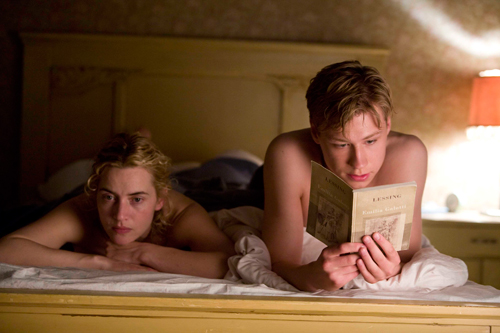THE READER opens in post-WWII Germany when teenager Michael Berg (David Cross & Ralph Fiennes) becomes ill with scarlet fever and is helped home by Hanna Schmitz (Kate Winslett), a stranger twice his age. When Michael recovers and seeks out Hanna to thank her, the two are quickly drawn into a passionate but secretive affair that only lasts one summer.
This movie probably touches on many young boy’s fantasies of being seduced by an attractive older woman and being taught all manner of unspeakable sexual acts. The only difference is their fantasies probably wouldn’t include them reading an inordinate amount of books while doing so. The books were the only caveat to Michael’s affair with Hanna. It isn’t until much later, while he’s attending law school and witness to a trial that includes Hanna, does he realize why.
THE READER spends most of the duration in flashbacks, drawing you in with the younger Michael’s affair with Hanna, and the time he spent in law school. It starts to bog down when we are treated to present day glimpses of the older Michael (Fiennes) reliving the mistakes he’s made regarding Hanna. I was rather impressed with the authentic sounding German accents the actors embraced. Unlike The Boy in the Striped Pajamas, the Germans sounded German, not British. Unfortunately, that was the most redeeming quality of the film, as the audience really didn’t have any one to root for. I certainly didn’t care for Hanna’s fate, though I appreciated the turmoil running through Michael’s mind. In the end, I didnt’ care for Michael, who came off more as a coward in the face of doing what is right. While many would believe that he redeemed himself in the end, it was really more of a token gesture than anything.
Unless you want to drool over Winslett’s naked body, I wouldn’t advise watching this anywhere else but from the comfort of your couch.
Read the Director and Studio’s rebuttal to “fringe critics” below:
Award-Winning director Stephen Daldry, Award-Winning producer Donna Gigliotti, Award-Winning screenwriter David Hare and Harvey Weinstein Condemn the Fringe Criticism of THE READER
Elie Wiesel, Holocaust Survivor and Nobel Peace Prize Winner and Abraham H. Foxman, Holocaust Survivor and ADL National Director Respond to Attacks on THE READER
NEW YORK, NY – (February 20, 2009) The following is a joint statement from Stephen Daldry, Donna Gigliotti, David Hare and Harvey Weinstein, who condemn the fringe criticism of THE READER:
We are proud of THE READER and everyone who made this film. It is outrageous and insulting that people have called it a “Holocaust denial film.” While entitled to their opinion, these allegations are fueled by ignorance and a misunderstanding of the material, and are based on unsubstantiated arguments.
The greatest films elicit great debate and conversation. Unfortunately, the recent attacks on THE READER have generated debates, not about the substance of the film, but about what people believe to be the intent of the filmmakers. To take a piece of art that was constructed with the hard work of many talented people and turn it into propaganda is plain ignorant. No one is suggesting that THE READER must be beloved by everyone. On the contrary, there is always room for criticism. If one does not like the film that is one matter; but to project one’s personal bias on the filmmaker’s objective is wrong and something we could no longer remain silent about.
THE READER is a film about how a generation of Germans lived in the shadow of one of the greatest crimes of the 20th century. Some detractors of the film have said that it is a piece of Holocaust revisionism; however Holocaust survivors, children of Holocaust survivors and a Nobel Peace Prize winner feel differently.
Elie Wiesel, a Holocaust survivor and Nobel Peace Prize winner, has praised, THE READER as “a film that deals powerfully with Germany’s reconciliation with its past.” He said that “it is not about the Holocaust; it is about what Germany did to itself and its future generations.” He called it “a faithful adaptation of an important book, that is still relevant today as genocide continues to be practiced around the world.”
Abe Foxman, the ADL National Director and a Holocaust survivor agrees with Mr. Wiesel. “As we move further away from the Holocaust we must continue to tell the story of the Shoah in ways that will reach and touch new generations. The Reader, which takes place in post-WWII Germany, clearly portrays the horrors of the Holocaust, not visually but intellectually and emotionally. There is no doubt to what Kate Winslet’s character, Hannah Schmitz, did during the war. Her guilt is given. At her trial her crimes are portrayed in detail and she is brought to justice for them. The Reader is not meant to be a factual re-telling of the Holocaust; for that we have documentaries. Rather it is about guilt and responsibility that is as important for our times as it was for post-war Germans.”
Unfortunately we live in a world where Holocaust denial still exists. Just a few weeks ago, the Vatican made headlines when the Pope lifted the excommunication of a Catholic Bishop who made statements denying the full extent of the Holocaust. In today’s world, with the recent genocides in Darfur, Cambodia, Rwanda and Bosnia, there are enough signs that bigotry still exists to an alarming degree. Denial and revisionist history of some of the greatest atrocities of our time can only lead to further violence and horrors.
THE READER is a film that has sparked controversy and it is not something we are shying away from. In this day and age we need healthy debate but what some have written is mudslinging at its worst and we think it is time to rise above it.
###




